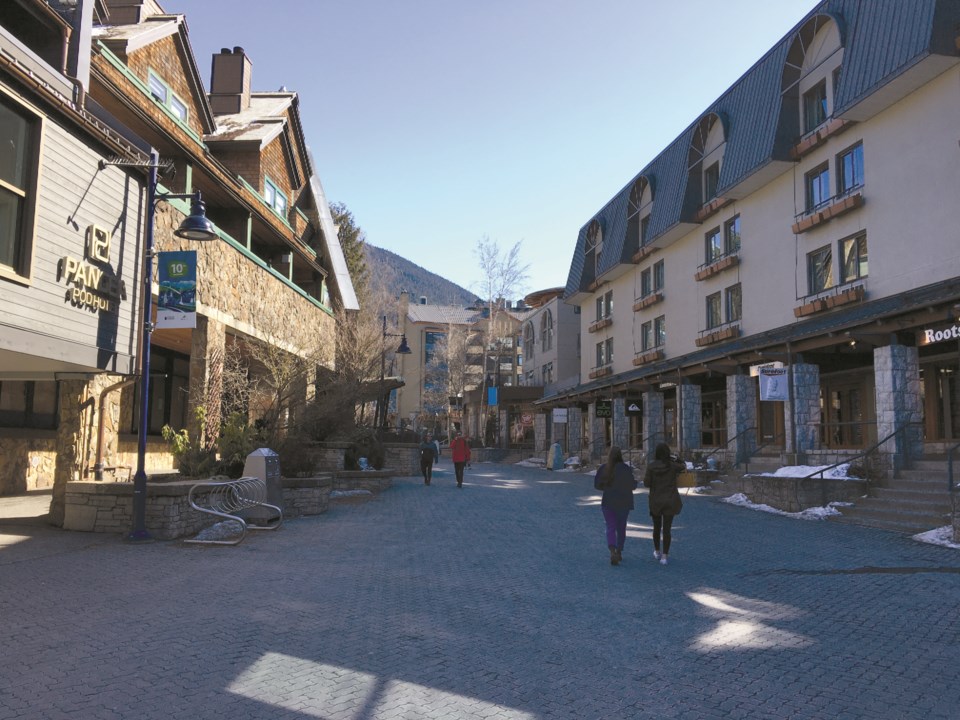The Resort Municipality of Whistler (RMOW) is kicking off a series of community conversations about the impacts of COVID-19.
Whistlerites are invited to take part in four virtual town hall meetings over Zoom this month, July 14, 16, 20 and 23, each with a different theme.
The meetings, hosted by Mayor Jack Crompton, chief administrative officer Virginia Cullen and a rotating cast of guests, will start with a short overview before participants break off into separate “rooms” to talk about specific questions.
“I am really excited to connect with and listen to our community in a new way. We want to build a solid understanding about what is happening in Whistler as we manage the effects of the COVID-19 pandemic and look towards recovery,” Crompton said in a release.
“The RMOW has been engaged with residents, business and community groups since the start of the pandemic but we want to hear from as many people as possible to really understand how COVID-19 is affecting all aspects of our community because we still may not know about some of those impacts.”
The themes, based off of Whistler’s updated guiding vision, are Sense of Place (July 14, 4 to 5:30 p.m., co-hosted by Heather Paul); Environment (July 16, 5 to 6:30 p.m., co-hosted by Mike Douglas); Tourism-based economy (July 20, 4 to 5:30 p.m., co-hosted by Danielle Kristmanson); and Community (July 23, 5 to 6:30 p.m., co-hosted by Chris Wrightson).
“Our goal is to collaborate with the community on potential solutions to the challenges we face,” Crompton said.
“Our challenges cannot be fixed unilaterally by the RMOW, or any level of government. This is an all-hands effort and it will take individuals, families, businesses, community groups and government to deliver a shared response that is up to the challenge.”
Participants are also asked to get a head start on the conversation by heading to https://my.thoughtexchange.com/708646825 and responding to the question “What are some of the things that have been top of your heart and mind during Whistler’s COVID-19 experience?”
Participants can then rate others’ answers, with those ratings being used to determine key issues, themes and the importance of the thoughts and ideas being shared.
Zoom details and registration information will be available at whistler.ca/communityconversations.
Q1 finance report shows calm before the storm
While Whistler’s financial outlook is a wildly different picture halfway through 2020 than it was at the outset of the year thanks to COVID-19, the first three months of the fiscal year were mostly on par with previous years.
Revenues were at nine per cent and expenditures 26 per cent of their annual budgeted amounts (compared to seven per cent and 25 per cent, respectively, at the same point last year), according to a report to council July 7 from director of finance Carlee Price.
Though the RMOW’s 2020 Q1 finances were generally comparable to last year, the effects of COVID-19 began to creep in mid-March.
“As you are well aware, the COVID-19 pandemic began to affect our community at the end of the first quarter, so this really is sort of the last quarter of normal-ish operations that we should expect for the full year 2020,” Price said.
Revenue losses from the March 17 closure of municipal facilities, like the Whistler Public Library and Meadow Park Sports Centre, will likely hit harder in Q2, as will the loss of municipal and regional district tax (MRDT) payments.
“The province of B.C. announced a deferment of tax payment which included MRDT amounts to Sept. 30; this meant the hotels were no longer required to remit MRDT amounts to the province,” Price said. “This was effective March 23, and so our quarterly MRDT payment for March, our monthly MRDT payment, was affected.”
While the RMOW collected $2,060,724 (or 15.3 per cent) of the $13,431,911 budgeted for 2020 MRDT and Resort Municipality Initiative payments by the end of Q1, the pandemic will make future MRDT payments “particularly difficult to predict both in size and timing,” according to the report.
Project spending at the end of Q1 was at 18.6 per cent of the annual budgeted amount, well above the five-year Q1 average of 5.5 per cent.
“The reasons for this are multiple; we did undertake a very meaningful project reprioritization exercise in the first quarter that adjusted many of these project budgets downward, and also moved some projects from 2020 into 2021,” Price said.
“We also had two very large projects in the first quarter that were already near completion. These included some carry-overs from 2019, specifically the Meadow Park Sports Centre cardio room and the swimming pool HVAC replacement.”
Resolution introduced to rename Squaw Valley Crescent
Also at the July 7 meeting, council passed a resolution to begin the renaming process for Squaw Valley Crescent in Creekside (see Pique, July 3, “Whistler council to start renaming process for Squaw Valley Crescent”).
The resolution, passed unanimously, directs staff to develop an engagement and naming process for renaming Squaw Valley Crescent and to return to council at an upcoming meeting for further consideration and direction to proceed.
“I think it’s a pity it took us this long to take action on it, but I’m very happy to see us moving forward on it,” said Coun. Cathy Jewett. “I hope that our partners will be able to help us move forward and come up with a name that’s appropriate for the neighbourhood, and appropriate for where we live.” n




